人教版(2019)必修第一册Unit 4 Natural disasters Language points课件(共35张)
文档属性
| 名称 | 人教版(2019)必修第一册Unit 4 Natural disasters Language points课件(共35张) |  | |
| 格式 | zip | ||
| 文件大小 | 1.2MB | ||
| 资源类型 | 教案 | ||
| 版本资源 | 人教版(2019) | ||
| 科目 | 英语 | ||
| 更新时间 | 2022-09-01 20:20:07 | ||
图片预览

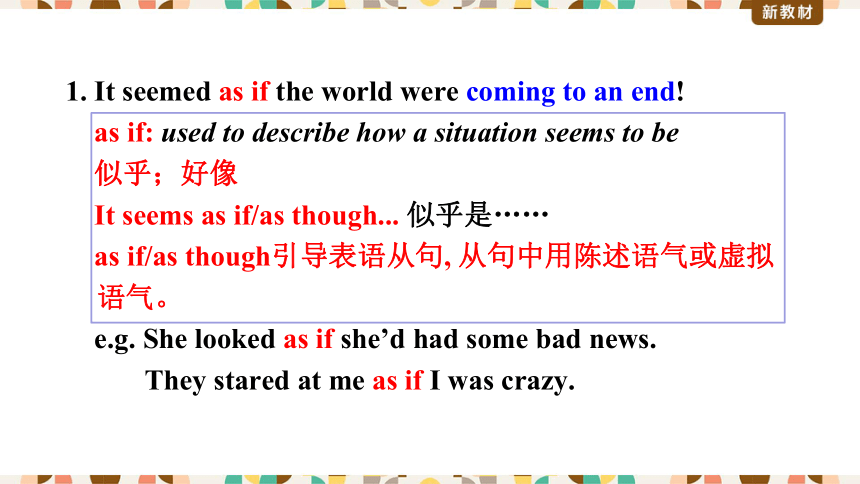
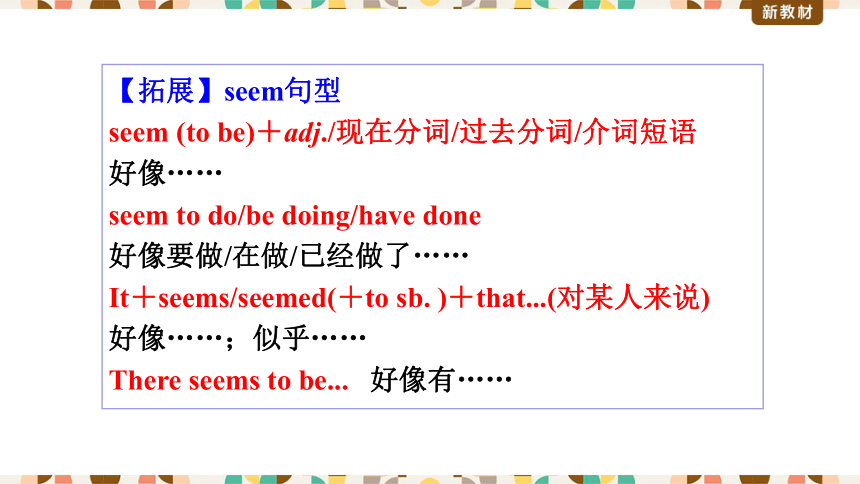
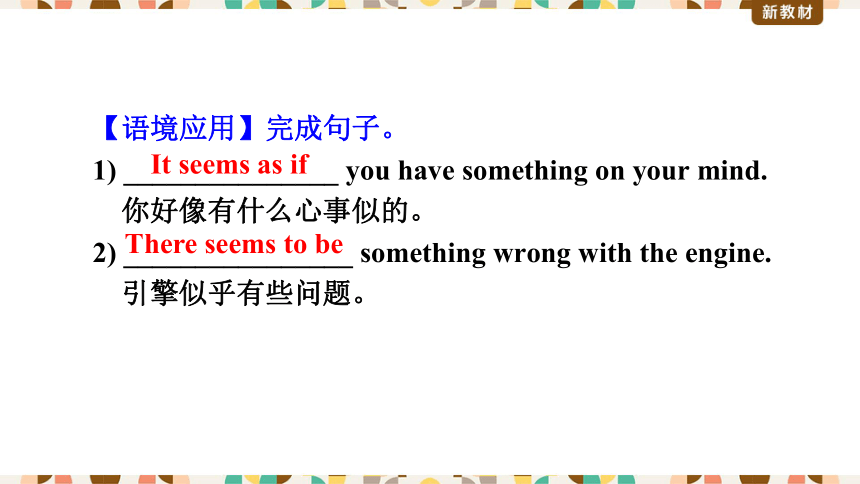
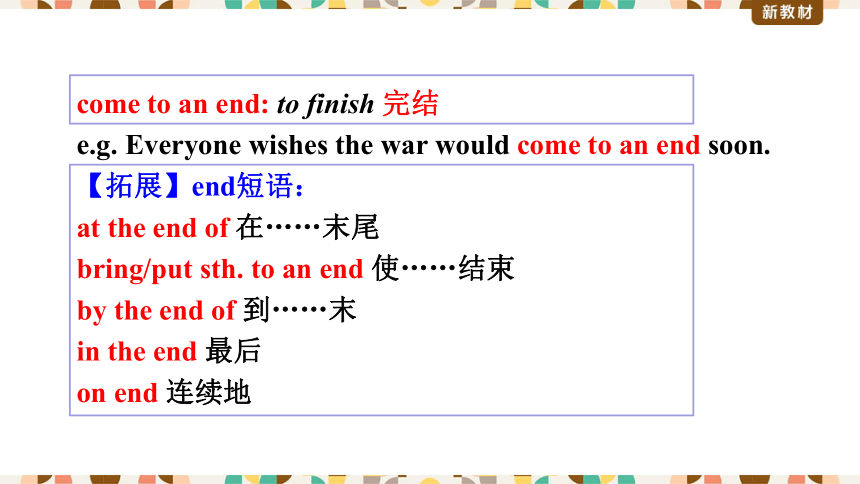
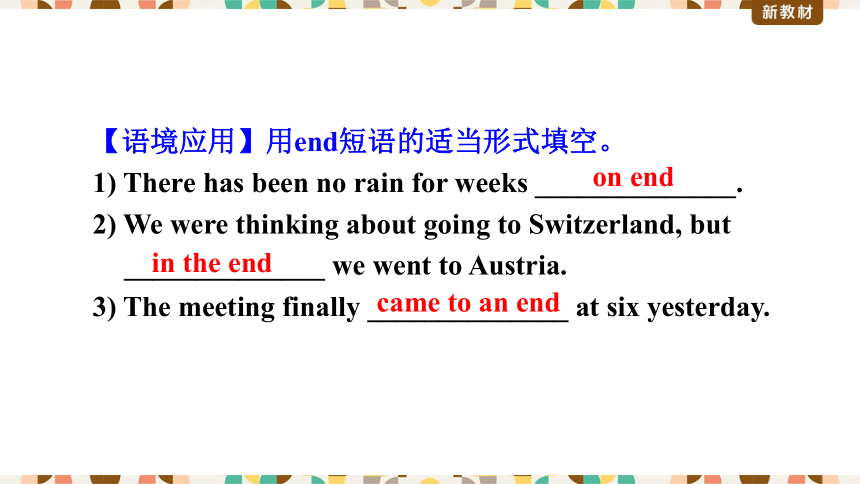
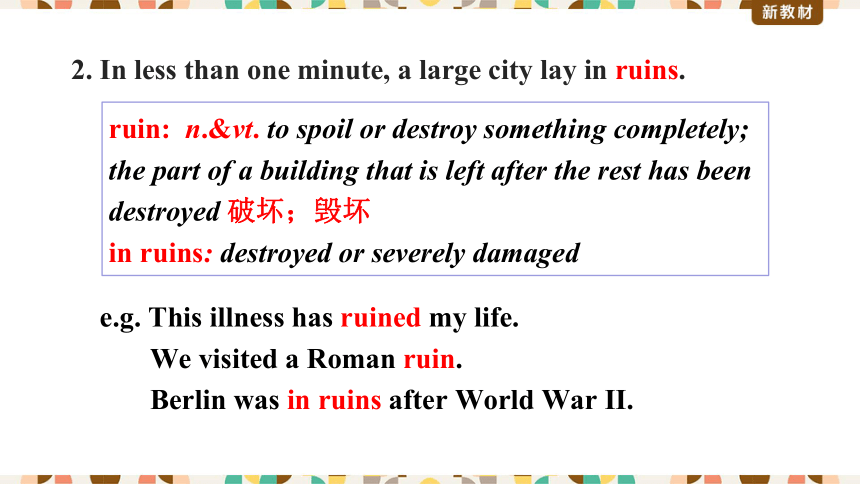
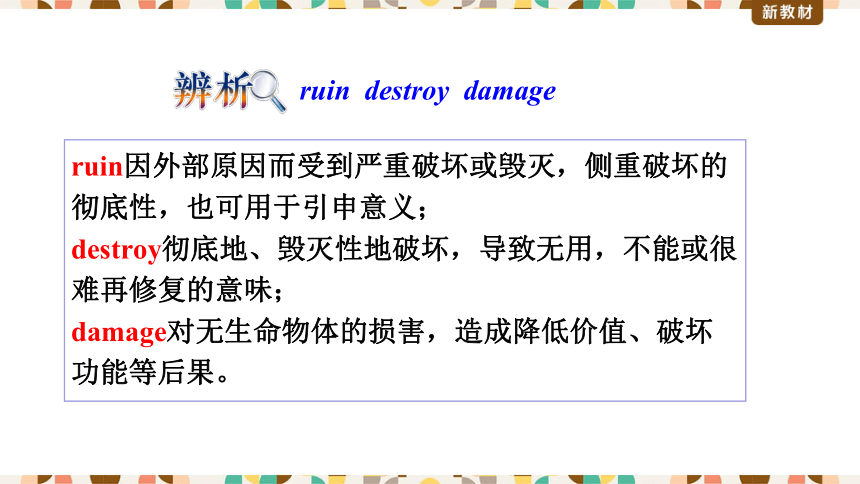
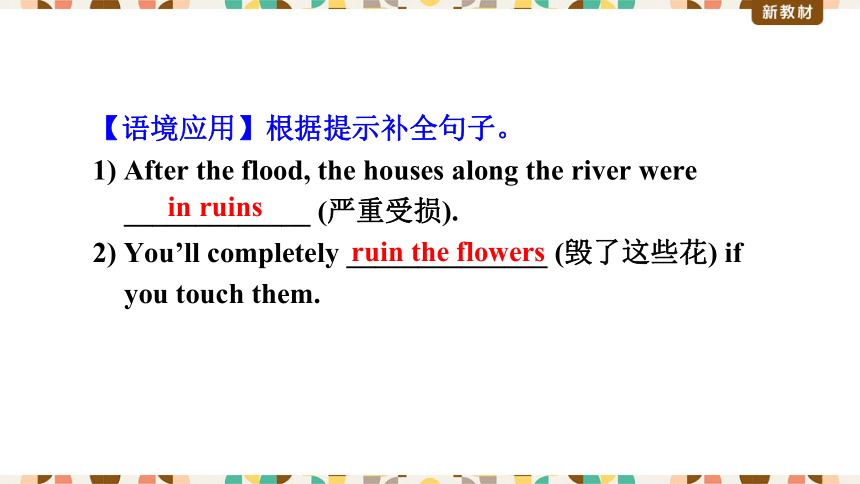
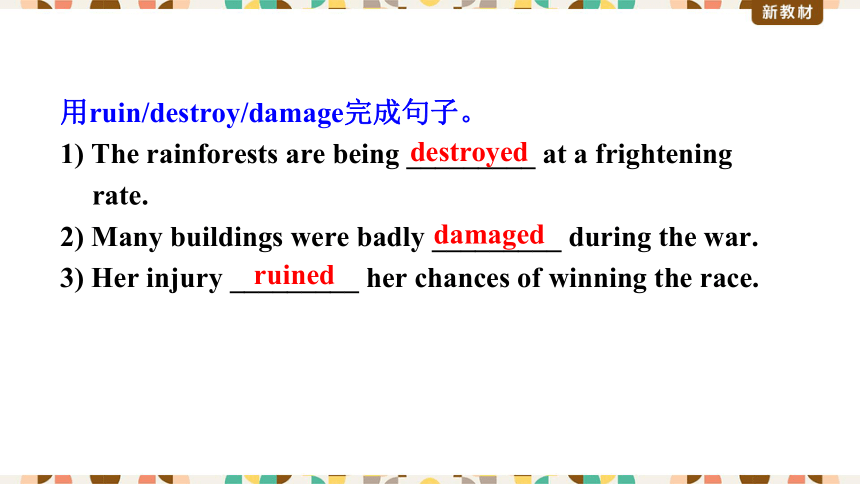
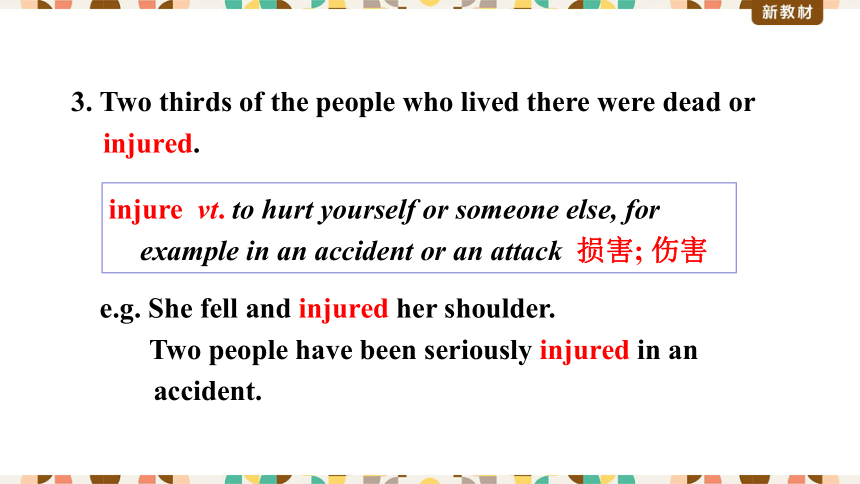
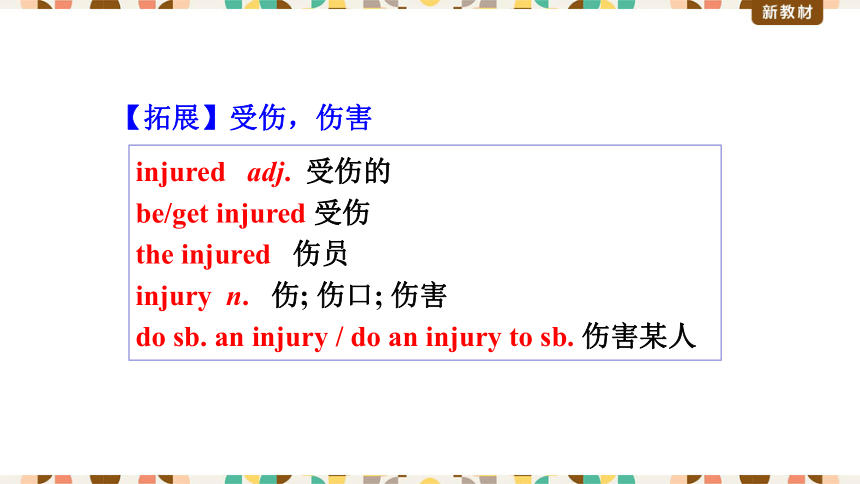
文档简介
(共35张PPT)
1. It seemed as if the world were coming to an end!
as if: used to describe how a situation seems to be
似乎;好像
It seems as if/as though... 似乎是……
as if/as though引导表语从句, 从句中用陈述语气或虚拟语气。
e.g. She looked as if she’d had some bad news.
They stared at me as if I was crazy.
【拓展】seem句型
seem (to be)+adj./现在分词/过去分词/介词短语
好像……
seem to do/be doing/have done
好像要做/在做/已经做了……
It+seems/seemed(+to sb. )+that...(对某人来说)
好像……;似乎……
There seems to be... 好像有……
【语境应用】完成句子。
1) _______________ you have something on your mind.
你好像有什么心事似的。
2) ________________ something wrong with the engine.
引擎似乎有些问题。
It seems as if
There seems to be
come to an end: to finish 完结
e.g. Everyone wishes the war would come to an end soon.
【拓展】end短语:
at the end of 在……末尾
bring/put sth. to an end 使……结束
by the end of 到……末
in the end 最后
on end 连续地
【语境应用】用end短语的适当形式填空。
1) There has been no rain for weeks ______________.
2) We were thinking about going to Switzerland, but ______________ we went to Austria.
3) The meeting finally ______________ at six yesterday.
on end
in the end
came to an end
2. In less than one minute, a large city lay in ruins.
e.g. This illness has ruined my life.
We visited a Roman ruin.
Berlin was in ruins after World War Ⅱ.
ruin: n.&vt. to spoil or destroy something completely; the part of a building that is left after the rest has been destroyed 破坏;毁坏
in ruins: destroyed or severely damaged
ruin因外部原因而受到严重破坏或毁灭,侧重破坏的彻底性,也可用于引申意义;
destroy彻底地、毁灭性地破坏,导致无用,不能或很难再修复的意味;
damage对无生命物体的损害,造成降低价值、破坏功能等后果。
ruin destroy damage
【语境应用】根据提示补全句子。
1) After the flood, the houses along the river were _____________ (严重受损).
2) You’ll completely ______________ (毁了这些花) if you touch them.
in ruins
ruin the flowers
用ruin/destroy/damage完成句子。
1) The rainforests are being _________ at a frightening rate.
2) Many buildings were badly _________ during the war.
3) Her injury _________ her chances of winning the race.
destroyed
damaged
ruined
3. Two thirds of the people who lived there were dead or injured.
e.g. She fell and injured her shoulder.
Two people have been seriously injured in an accident.
injure vt. to hurt yourself or someone else, for example in an accident or an attack 损害; 伤害
【拓展】受伤,伤害
injured adj. 受伤的
be/get injured 受伤
the injured 伤员
injury n. 伤; 伤口; 伤害
do sb. an injury / do an injury to sb. 伤害某人
【语境应用】完成句子。
1) A month before my first , one of my ankles _____________ (injure) and this meant not running for two weeks, leaving me only two weeks to train.
2) By mile 17, I became out of breath and the once ___________ (injure) ankle hurt badly.
3) Don’t lift that tool box—you’ll _______________________
__________________! (伤着自己;injury)
injured
was injured
do yourself an injury/ do
an injury to yourself
injure意外事故中受伤,或健康、名誉、感情等伤害;
hurt伴有强烈疼痛的创伤,也指言行给人的情感造成无意的、较小的伤害;hurt比injure更为通俗,injure比hurt语气强。
wound有意伤害,尤指在受伤,伤口,也可指对感情上的伤害;
harm 表示精神或肉体上的伤害,或引起不安或不便。还用于抽象事物或不道德的事。
injure, hurt, wound, harm
【语境应用】 用以上单词完成句子。
1) Angus ________ his leg playing football yesterday.
2) Gunmen killed two people and __________ six others in an attack today.
3) I have never ________ anyone.
4) It ________ me when you talk like that.
injured
wounded
harmed
hurts
4. About 75 percent of the city’s factories and buildings, 90 percent of its homes, and all of its hospitals were gone. (翻译)
整座城市基本上都被毁了。城市里大约75%的工厂和建筑物、90%的家园和所有的医院都消失了。
简单句,主语: about 75 percent of the city’s factories and buildings, 90 percent of its homes all of its hospitals。
分数表达
百分之……:用 percent。
e.g. 65 percent of the houses
分数的表达:先分子,后分母;分子用基数词,分母用序数词。分子大于1时分母用复数形式。
e.g. one fourth四分之一;three fifths五分之一
三分之二:two thirds
二又五分之三:two and three fifths
二分之一:a half/one half;
四分之一:one fourth或a quarter/one quarter
e.g. A lot of parcels (包裹) are transported to all over China during the “Double-11” festival every year.
A lot of money has been wasted for no reason.
More than 70% of the surface of the earth is covered by water.
some of, plenty of, a lot of, most of, the rest of, all of, half of, part of 以及“分数/百分数 + of+名词”做主语时,谓语动词单复数由of后面的名词或代词的单复数决定。
【语境应用】完成句子。
This is because two-thirds of the earth’s surface _________ (make) up of vast oceans.
More than two-thirds of the students _________ (see) the film already.
The factory used 65 percent of the raw materials, the rest of which ________ (be) saved for other purposes.
is made
have seen
were
5. People were in shock…
shock n. you did not expect it, and it makes you feel very surprised, and usually upset 震惊;休克
vt. to make someone feel very surprised and upset, and unable to believe what has happened (使)震惊
in shock 震惊;吃惊
shocked adj. 惊愕的 (人) shocking adj. (物)
e.g. It was a real shock to hear that the factory would have to close.
Rescue workers were shocked by what they saw.
He was shocked at her smoking.
【语境应用】完成句子。
1) I still remember visiting a friend who’d lived here for five years and I ___________ (shock) when I learnt she hadn’t cooked once in all that time.
2) After the __________ news spread throughout the whole city, everyone felt ________. (shock)
3) She was __________ (震惊地) for about two weeks after the accident.
was shocked
shocking
shocked
in shock
6. The army sent 150,000 soldiers to Tangshan to dig out those who were trapped and to bury the dead.
trap vt. to prevent someone from escaping from somewhere, especially a dangerous place; to be in a bad situation from which you cannot escape 使落入险境;落入圈套
n. a piece of equipment for catching animals; a clever trick that is used to catch someone or to make them do or say something that they did not intend to 险境;陷阱
bury vt. to put someone who has died in a grave 埋葬;安葬
bury oneself in 埋头于;专心于
dig out: If you dig out of a place, to get someone or something out from the things surrounding them. 挖出;发现
dig down 挖倒
dig into 钻研
dig out 挖掘出;找出
dig for 发掘;搜集(试试、资料等)
dig in 掘土以渗入肥料;开始认真工作
e.g. The only way to catch mice is to set a trap.
There's no way out! We're trapped!
The skiers were buried under the snow.
Latest reports say that landslides buried entire villages.
Rescue crews have been digging people out of collapsed buildings.
【语境应用】用bury, trap, dig完成句子。
1) At last the truth ___________. 最后真相被查明。
2) 那所房子被掩埋在十英尺厚的雪下面。
The house ________________ ten-foot snow.
3) 他和他妻子葬在一起。
He _________________ his wife.
4) A rescue worker risked his life saving two tourists who _________________ (被困在) the mountains for two days.
was buried under
was buried with
was dug out
had been trapped in
7. Slowly, the city began to breathe again.
e.g. I’m too tired to breathe.
It’s good for people to breathe fresh air.
Please breathe in and then breathe out slowly.
Let’s hold our breath and see what will happen.
breathe vt.&vi. to take air into your lungs and send it out again 呼吸
breath n. 呼吸
【拓展】breath短语
hold one’s breath 屏息; 屏气
take a deep breath 深呼吸
lose one’s breath 喘不过气来
out of breath 气喘吁吁
catch one’s breath 恢复正常呼吸
【语境应用】完成句子。
1) When we climbed to the top of the building, we _________________ (上气不接下气).
2) If you run very fast, you must _______________ (喘不过气来).
3) 生活在这里的人们每天呼吸着脏空气。
People living here breathe dirty air every day.
were out of breath
lose your breath
8. With strong support from the government and the tireless efforts of the city’s people…
e.g. The report shows that we are making some progress but that we need to make greater efforts.
effort n. an attempt to do something, especially when this involves a lot of hard work or determination
努力;艰难尝试,尽力
make efforts 努力; 尽力
【归纳】effort短语
【拓展】尽一切做某事:
make an effort/efforts/every effort to do sth.
尽一切努力做某事
spare no effort 不遗余力; 尽力
with (an) effort 努力地
without effort 毫不费力地
try/do one’s best to do sth.
do all that sb. can to do sth.
do what sb. can to do sth.
【语境应用】完成句子。
1) 我们必须尽一切努力以减缓病情的发展。
We must _________________ to slow down the progress of the illness.
make every effort
2) 他毫不费力地举起那块大石头。
He lifted the big stone _____________.
3) Many excellent Chinese architects _________________
______ (正做出巨大努力) to take the center stage.
without effort
are making great
efforts
9. Some were found alive, though they were suffering from terrible injuries.
suffer vt. to experience physical or mental pain 遭受;蒙受
vi. if someone suffers an unpleasant or difficult experience, or is in a difficult situation, it happens to them or they experience it(因疾病、痛苦、悲伤等)受苦
suffer from 受……折磨;患……病
suffering n. 痛苦, 苦恼;劳苦, 困难
e.g. The city suffered serious damage during the earthquake.
I can’t suffer the pain in my heart.
My father suffers from high blood pressure.
Mr. White suffered a lot from cold and hunger.
【语境应用】完成句子。
1) He ____________________ (受了好多苦) when he was a child.
2) Do you often ____________________ (遭受头痛的折磨吗)
suffered a lot (of pain)
suffer from a headache
1. It seemed as if the world were coming to an end!
as if: used to describe how a situation seems to be
似乎;好像
It seems as if/as though... 似乎是……
as if/as though引导表语从句, 从句中用陈述语气或虚拟语气。
e.g. She looked as if she’d had some bad news.
They stared at me as if I was crazy.
【拓展】seem句型
seem (to be)+adj./现在分词/过去分词/介词短语
好像……
seem to do/be doing/have done
好像要做/在做/已经做了……
It+seems/seemed(+to sb. )+that...(对某人来说)
好像……;似乎……
There seems to be... 好像有……
【语境应用】完成句子。
1) _______________ you have something on your mind.
你好像有什么心事似的。
2) ________________ something wrong with the engine.
引擎似乎有些问题。
It seems as if
There seems to be
come to an end: to finish 完结
e.g. Everyone wishes the war would come to an end soon.
【拓展】end短语:
at the end of 在……末尾
bring/put sth. to an end 使……结束
by the end of 到……末
in the end 最后
on end 连续地
【语境应用】用end短语的适当形式填空。
1) There has been no rain for weeks ______________.
2) We were thinking about going to Switzerland, but ______________ we went to Austria.
3) The meeting finally ______________ at six yesterday.
on end
in the end
came to an end
2. In less than one minute, a large city lay in ruins.
e.g. This illness has ruined my life.
We visited a Roman ruin.
Berlin was in ruins after World War Ⅱ.
ruin: n.&vt. to spoil or destroy something completely; the part of a building that is left after the rest has been destroyed 破坏;毁坏
in ruins: destroyed or severely damaged
ruin因外部原因而受到严重破坏或毁灭,侧重破坏的彻底性,也可用于引申意义;
destroy彻底地、毁灭性地破坏,导致无用,不能或很难再修复的意味;
damage对无生命物体的损害,造成降低价值、破坏功能等后果。
ruin destroy damage
【语境应用】根据提示补全句子。
1) After the flood, the houses along the river were _____________ (严重受损).
2) You’ll completely ______________ (毁了这些花) if you touch them.
in ruins
ruin the flowers
用ruin/destroy/damage完成句子。
1) The rainforests are being _________ at a frightening rate.
2) Many buildings were badly _________ during the war.
3) Her injury _________ her chances of winning the race.
destroyed
damaged
ruined
3. Two thirds of the people who lived there were dead or injured.
e.g. She fell and injured her shoulder.
Two people have been seriously injured in an accident.
injure vt. to hurt yourself or someone else, for example in an accident or an attack 损害; 伤害
【拓展】受伤,伤害
injured adj. 受伤的
be/get injured 受伤
the injured 伤员
injury n. 伤; 伤口; 伤害
do sb. an injury / do an injury to sb. 伤害某人
【语境应用】完成句子。
1) A month before my first , one of my ankles _____________ (injure) and this meant not running for two weeks, leaving me only two weeks to train.
2) By mile 17, I became out of breath and the once ___________ (injure) ankle hurt badly.
3) Don’t lift that tool box—you’ll _______________________
__________________! (伤着自己;injury)
injured
was injured
do yourself an injury/ do
an injury to yourself
injure意外事故中受伤,或健康、名誉、感情等伤害;
hurt伴有强烈疼痛的创伤,也指言行给人的情感造成无意的、较小的伤害;hurt比injure更为通俗,injure比hurt语气强。
wound有意伤害,尤指在受伤,伤口,也可指对感情上的伤害;
harm 表示精神或肉体上的伤害,或引起不安或不便。还用于抽象事物或不道德的事。
injure, hurt, wound, harm
【语境应用】 用以上单词完成句子。
1) Angus ________ his leg playing football yesterday.
2) Gunmen killed two people and __________ six others in an attack today.
3) I have never ________ anyone.
4) It ________ me when you talk like that.
injured
wounded
harmed
hurts
4. About 75 percent of the city’s factories and buildings, 90 percent of its homes, and all of its hospitals were gone. (翻译)
整座城市基本上都被毁了。城市里大约75%的工厂和建筑物、90%的家园和所有的医院都消失了。
简单句,主语: about 75 percent of the city’s factories and buildings, 90 percent of its homes all of its hospitals。
分数表达
百分之……:用 percent。
e.g. 65 percent of the houses
分数的表达:先分子,后分母;分子用基数词,分母用序数词。分子大于1时分母用复数形式。
e.g. one fourth四分之一;three fifths五分之一
三分之二:two thirds
二又五分之三:two and three fifths
二分之一:a half/one half;
四分之一:one fourth或a quarter/one quarter
e.g. A lot of parcels (包裹) are transported to all over China during the “Double-11” festival every year.
A lot of money has been wasted for no reason.
More than 70% of the surface of the earth is covered by water.
some of, plenty of, a lot of, most of, the rest of, all of, half of, part of 以及“分数/百分数 + of+名词”做主语时,谓语动词单复数由of后面的名词或代词的单复数决定。
【语境应用】完成句子。
This is because two-thirds of the earth’s surface _________ (make) up of vast oceans.
More than two-thirds of the students _________ (see) the film already.
The factory used 65 percent of the raw materials, the rest of which ________ (be) saved for other purposes.
is made
have seen
were
5. People were in shock…
shock n. you did not expect it, and it makes you feel very surprised, and usually upset 震惊;休克
vt. to make someone feel very surprised and upset, and unable to believe what has happened (使)震惊
in shock 震惊;吃惊
shocked adj. 惊愕的 (人) shocking adj. (物)
e.g. It was a real shock to hear that the factory would have to close.
Rescue workers were shocked by what they saw.
He was shocked at her smoking.
【语境应用】完成句子。
1) I still remember visiting a friend who’d lived here for five years and I ___________ (shock) when I learnt she hadn’t cooked once in all that time.
2) After the __________ news spread throughout the whole city, everyone felt ________. (shock)
3) She was __________ (震惊地) for about two weeks after the accident.
was shocked
shocking
shocked
in shock
6. The army sent 150,000 soldiers to Tangshan to dig out those who were trapped and to bury the dead.
trap vt. to prevent someone from escaping from somewhere, especially a dangerous place; to be in a bad situation from which you cannot escape 使落入险境;落入圈套
n. a piece of equipment for catching animals; a clever trick that is used to catch someone or to make them do or say something that they did not intend to 险境;陷阱
bury vt. to put someone who has died in a grave 埋葬;安葬
bury oneself in 埋头于;专心于
dig out: If you dig out of a place, to get someone or something out from the things surrounding them. 挖出;发现
dig down 挖倒
dig into 钻研
dig out 挖掘出;找出
dig for 发掘;搜集(试试、资料等)
dig in 掘土以渗入肥料;开始认真工作
e.g. The only way to catch mice is to set a trap.
There's no way out! We're trapped!
The skiers were buried under the snow.
Latest reports say that landslides buried entire villages.
Rescue crews have been digging people out of collapsed buildings.
【语境应用】用bury, trap, dig完成句子。
1) At last the truth ___________. 最后真相被查明。
2) 那所房子被掩埋在十英尺厚的雪下面。
The house ________________ ten-foot snow.
3) 他和他妻子葬在一起。
He _________________ his wife.
4) A rescue worker risked his life saving two tourists who _________________ (被困在) the mountains for two days.
was buried under
was buried with
was dug out
had been trapped in
7. Slowly, the city began to breathe again.
e.g. I’m too tired to breathe.
It’s good for people to breathe fresh air.
Please breathe in and then breathe out slowly.
Let’s hold our breath and see what will happen.
breathe vt.&vi. to take air into your lungs and send it out again 呼吸
breath n. 呼吸
【拓展】breath短语
hold one’s breath 屏息; 屏气
take a deep breath 深呼吸
lose one’s breath 喘不过气来
out of breath 气喘吁吁
catch one’s breath 恢复正常呼吸
【语境应用】完成句子。
1) When we climbed to the top of the building, we _________________ (上气不接下气).
2) If you run very fast, you must _______________ (喘不过气来).
3) 生活在这里的人们每天呼吸着脏空气。
People living here breathe dirty air every day.
were out of breath
lose your breath
8. With strong support from the government and the tireless efforts of the city’s people…
e.g. The report shows that we are making some progress but that we need to make greater efforts.
effort n. an attempt to do something, especially when this involves a lot of hard work or determination
努力;艰难尝试,尽力
make efforts 努力; 尽力
【归纳】effort短语
【拓展】尽一切做某事:
make an effort/efforts/every effort to do sth.
尽一切努力做某事
spare no effort 不遗余力; 尽力
with (an) effort 努力地
without effort 毫不费力地
try/do one’s best to do sth.
do all that sb. can to do sth.
do what sb. can to do sth.
【语境应用】完成句子。
1) 我们必须尽一切努力以减缓病情的发展。
We must _________________ to slow down the progress of the illness.
make every effort
2) 他毫不费力地举起那块大石头。
He lifted the big stone _____________.
3) Many excellent Chinese architects _________________
______ (正做出巨大努力) to take the center stage.
without effort
are making great
efforts
9. Some were found alive, though they were suffering from terrible injuries.
suffer vt. to experience physical or mental pain 遭受;蒙受
vi. if someone suffers an unpleasant or difficult experience, or is in a difficult situation, it happens to them or they experience it(因疾病、痛苦、悲伤等)受苦
suffer from 受……折磨;患……病
suffering n. 痛苦, 苦恼;劳苦, 困难
e.g. The city suffered serious damage during the earthquake.
I can’t suffer the pain in my heart.
My father suffers from high blood pressure.
Mr. White suffered a lot from cold and hunger.
【语境应用】完成句子。
1) He ____________________ (受了好多苦) when he was a child.
2) Do you often ____________________ (遭受头痛的折磨吗)
suffered a lot (of pain)
suffer from a headache
